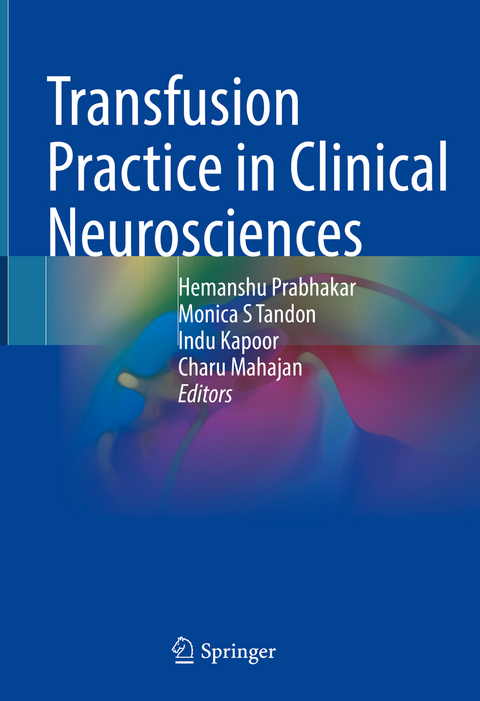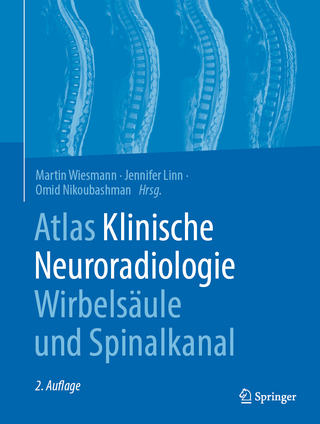
Transfusion Practice in Clinical Neurosciences
Springer Nature (Verlag)
978-981-19-0953-5 (ISBN)
Fluid management is the basis of all clinical management in neurosurgical patients. This is a complete book on transfusion practice in clinical neurosciences. It covers in detail the fluids and blood transfusion practice, also discussing the role of total parenteral nutrition in relation to neurologic patients. The importance of fluid management clinically can be seen as on one hand it plays a significant role in maintaining the hydration of the patient and on the other provides sufficient relaxation to the brain to facilitate surgery. The use of hyperosmolar therapy is unique to the practice of clinical neurosciences. Certain fluid types such as those containing glucose are detrimental to the brain. Likewise, large fluid shifts and blood loss are often observed during neurosurgical procedures. It is relevant to understand the physiology of blood and blood transfusion. This book covers all of these topics in their true relevance. It also provides an evidence-based practice offluid administration for all neurologic patients including, pediatric and geriatric. The proposed book will be useful for trainees and clinicians in any field of clinical neurosciences. It would be very useful for residents and fellows pursuing their courses in neuroanesthesia, neurocritical care, neurosurgery, emergency medicine, anesthesia, and critical care. Fellows, Resident doctors, postgraduates, and even undergraduates would be benefited from this book. The book would be a ready-reckoner and useful during the clinical practice of physicians from varied specialties.
Dr Hemanshu Prabhakar is a Professor at the Department of Neuroanaesthesiology and Critical Care at All India Institute of Medical Sciences (AIIMS), New Delhi, India. He received his training in neuroanesthesia and completed his PhD in the same institute. He is the first Indian to be awarded the degree of PhD in the country. He is a recipient of the AIIMS Excellence Award for his notable contribution to academia and has published over 250 papers in peer-reviewed national and international journals. Dr. Prabhakar is a reviewer for various national and international journals, and is also a review author for the Cochrane Collaboration. He has a special interest in evidence-based practice of neuroanesthesia. Dr. Prabhakar is a member of various national and international neuroanesthesia societies and is past secretary of the Indian Society of Neuroanesthesia and Critical Care. He is an invited scholar for various national and international conferences. He is on the editorial boardof the Indian Journal of Palliative Care and is the past executive editor of the Journal of Neuroanaesthesiology and Critical Care. He is the first Indian to publish international books in the speciality of neuroanesthesia. He is featured in the Limca Book of Records as a prolific writer in the field of neuroanaesthesiology. The honorary fellowship by the Society of Neurocritical Care (SNCC) has been conferred upon him. Dr Monica S Tandon is currently a Director Professor in the Department of Anesthesthesiology and Intensive Care (Neuroanesthesia division) at G.B.Pant Institute of Postgraduate Medical Education and Research(GIPMER), New Delhi, India. She received her training in Neuro-anesthesia and Neurocritical Care at the same institute and has over twenty years of experience in the subject. She has numerous publications in national and international journals, and has written chapters in several books on Neuroanesthesia and Neurointensive care. She is also a Section Editor for the Journal of Neuroanesthesiology and Critical Care. Besides being a member of several national, scientific societies, she has served on the Executive committee of the Indian Society of Neuroanesthesiology and Critical Care. She has a keen interest in mentoring students, and has delivered talks on a wide array of neuroanesthesia topics, as an invited faculty at numerous national and international conferences. Dr Indu Kapoor is an Additional Professor in the Department of Neuroanaesthesiology and Critical Care at All India Institute of Medical Sciences (AIIMS), New Delhi, India. She received her training in neuroanesthesia at the same institute. Dr. Kapoor has a special interest in evidence-based practice in neuroanesthesia. She has several publications in national and international journals to her credit and has written numerous chapters for various national and international books. She has published over 100 papers in several national and international journals. She is also a reviewer of various scientific journals and a review author for the Cochrane Collaboration. She is a recipient of prestigious TN Jha award at both state and national level for her thesis work. Additionally, she is a member of various scientific societies and has been an invited faculty member at various conferences. Dr Charu Mahajan is an Additional Professor in the Department of Neuroanaesthesiology and Critical Care at All India Institute of Medical Sciences (AIIMS), New Delhi, India. After completing DM in neuroanesthesia at AIIMS, she joined the institute as a faculty member. She has over a decade of research experience and has received various awards for scientific presentations. She has several publications in various national and international journals, co-authored books and authored chapters in many books. She is a reviewer for the Cochrane Collaboration. Dr. Mahajan is also a member of various scientific societies and is a reviewer for several reputable scientific journals.
Part 1 Fluids: Basic consideration.- 1 Body and brain fluid and volume kinetics.- 2 Basics of perioperative fluid requirements in neurosurgical patients.- Part 2 Fluids: Types of fluids.- 3 Crystalloids.- 4 Colloids.- 5 Hyperosmolar fluids.- 6 Balanced fluids.- Part 3 Fluids: Monitoring fluids.- 7 Invasive versus non-invasive haemodynamic monitoring.- 8 Goal-Directed Fluid Therapy.- Part 4 Fluids: Special considerations.- 9 Perioperative Fluid Management for the Neurocritically Ill Patient.- 10 Fluid Management in Pediatric Neurosurgery.- 11 Fluid management in geriatric neurosurgery.- 12 Fluid management in pituitary surgery.- 13 Fluid management in aneurysmal Subarachnoid hemorrhage.- 14 Fluid Management in Traumatic Brain Injury.- 15 Fluid management in spine surgery.- 16 Fluid management in neurosurgical patients with coexisting cardiac diseases.- 17 Fluid management in neurosurgical patients with coexisting pulmonary problems.- 18 Fluid Management In Neurosurgical Patients With Coexisting Renal Problems.- 19 Fluid management in neurointensive care.- 20 Fluid management in sepsis.- Part 5 Fluids: Complications.- 21 Acid-base imbalance.- 22 Coagulation abnormalities.- 23 Adverse effects of fluid administration.- Part 6 Blood and blood products: Basic consideration.- 24 Composition of Blood.- 25 The Coagulation Cascade.- Part 7 Blood and blood products: Blood and components.- 26 Whole blood and Packed RBCs.- 27 Fresh Frozen Plasma.- 28 Platelet rich concentrates.- 29 Cryoprecipitate.- 30 Clotting factor concentrates.- 31 The Use of Activated Recombinant Factor VII in Neurosurgery.- Part 8 Blood and blood products: Anticoagulants.- 32 Anticoagulants in Use.- 33 Other Antithrombotics: Antiplatelets and Fibrinolytics.- 34 Antithrombotic reversal agents.- Part 9 Blood and blood products: General considerations.- 35 Perioperative assessment of hemorrhagic risk.- 36 Blood Salvage Techniques.- 37 Blood loss estimation techniques.- 38 Monitoring Anticoagulation.- 39 Adjunct therapies to minimize blood loss.- Part 10 Blood and blood products: Special considerations.- 40 Management of Patients on Anticoagulants and Antiplatelets in Neurosurgery.- 41 Massive blood loss in neurosurgery.- 42 Blood Transfusion in Patients with Acute Traumatic Brain Injury.- 43 Transfusion Practice in a Jehovah Witness.- 44 Transfusion practice in patients with hereditary and acquired coagulation disorders.- 45 Blood Transfusion practices in Sepsis.- Part 11 Blood and blood products: Complications.- 46 Neurological complications of the anticoagulation.- 47 Complications related to blood products.- Part 12 Total parenteral nutrition.- 48 Basics of Total Parenteral Nutrition.- 49 Monitoring and complications of total parenteral nutrition.- 50 Special neurologic patient population and TPN.
| Erscheinungsdatum | 23.06.2022 |
|---|---|
| Zusatzinfo | 35 Illustrations, color; 5 Illustrations, black and white; XVI, 600 p. 40 illus., 35 illus. in color. |
| Verlagsort | Singapore |
| Sprache | englisch |
| Maße | 178 x 254 mm |
| Themenwelt | Medizin / Pharmazie ► Medizinische Fachgebiete ► Anästhesie |
| Medizinische Fachgebiete ► Chirurgie ► Neurochirurgie | |
| Medizin / Pharmazie ► Medizinische Fachgebiete ► Neurologie | |
| Schlagworte | Blood Transfusion • Fluids • neuroanesthesia • Neurocritical Care • neurosurgery |
| ISBN-10 | 981-19-0953-9 / 9811909539 |
| ISBN-13 | 978-981-19-0953-5 / 9789811909535 |
| Zustand | Neuware |
| Informationen gemäß Produktsicherheitsverordnung (GPSR) | |
| Haben Sie eine Frage zum Produkt? |
aus dem Bereich


